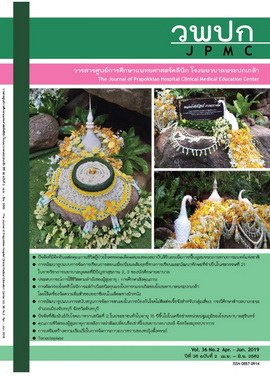The development of a Learning Process Methodology to increase learning outcomes and to develop 21st Century skills in the courses of Nursing care of persons with health problem II,III for nursing students
Main Article Content
Abstract
Background: Nursing care of persons with health problems II, III are complicated subjects. There were only small number of students could pass each learning outcome evaluations. In the past, a learning process methodology was mainly through lectures. This learning process methodology could promote students’ learning skills, but not enough to help them to develop their 21st Century skills.
Objectives: This study aimed to examine a current learning process methodology, to develop a new learning process methodology and to determine the effects of a new learning process methodology on learning outcomes and 21st Century skills for the nursing students.
Materials and method: The present study was research and development. Participants were 135 3rd year nursing students. Focus group, pre-post test, and an evaluation form of information retrieval skills were used to gather the data. Percentage, mean, standard deviation, paired t-test, and thematic analysis were selected to analyse the data.
Results: Findings of an examination of current learning process methodology demonstrated that instructors, students, learning process methodologies, and classroom facilitators affected students’ learning process. Modern technologies, e-learning, line, and Kahoot, were applied to a new developed learning process methodology to help students to have better understanding about the subjects and helped them to develop their information retrieval skills and critical thinking. The results of twice trying-out a new learning process methodology revealed that students’ post-test scores were statistically significantly higher than pre-test scores at 0.01 (t=-17.078, t= -17.104, p-value < 0.001). Their information retrieval skills were in high level (x̄ = 12.38, SD = 0.71). From focus groups, the new developed learning process methodology could arouse students’ interest and motivation to the lectures. It also helped them to remember the lesson content better as they could see pictures and hear an explanation at the same time. The students had a chance to practice their analytical thinking skill while playing Kahoot game. These also relieved students’ stress from attending long lectures and could create enjoyable learning environments.
Conclusion: A new learning process methodology significantly increases the learning outcomes of nursing students and helps them to develop their 21st Century skills. This also changes learning paradigm shift from lecture to the new learning process methodology which is suitable for generation Y students and social change.
Article Details
References
Praboromarajchanok Institute of Health Workforce Development. Quality assurance in education handbook for all colleges under PBRI. Nonthaburi: Praboromarajchanok Institute; 2015.
Boromarajonani College of Nursing, Sawanpracharak Nakhonsawan. Strategic plan 2016-2020. Nakhonsawan: Boromarajonani College of Nursing, Sawanpracharak Nakhonsawan ; 2016.
Bellanca J, Brendt R. 21st Century skills : rethinking how students learn. Bloomington,IN : Solution Tree Press; 2010.
Sovath I, Wattanatorn A, Thamrongsotthisakul W. Learning style preference and instructional strategy for enhancing potential of ASEAN graduate students in Thai higher education. Journal of Education Naresuan University. 2015; 17(2): 161-70
Brady K.P., Holcomb L.B., Smith B.V. The use of alternative social networking sites in higher educational settings : a case study of the e-Learning benefits of ning in education. Journal of Interactive Online Learning 2010; 9:151-70.
Anderson NG. Practical process research and development. 2nd ed. Massachusetts: Academic Press; 2012.
Polit DF, Beck CT. Essentials of nursing research: appraising evidence for nursing practice. 7th ed. London: Lippincott Williams& Wilkins; 2009.
Redfield KA., Lawrence BH. Foundations of learning. 4th ed. Hampton: Pacific Crest;2009.
Boonthum A, Yutthawisut S, Boaleung T, Kaewprom C, Rungruang K. Development on reflective clinical skills of nurse students. J Prapokklao Hosp Clin Med Educat Center 2015; 32: 244- 55.
Chatmaneerungcharoen N. A study of teaching and learning acceptance of E- learning for teachers and undergraduate students Kasetsart University, Kamphaeng Saen Campus. Veridian E-Journal, SU 2012; 5(2): 379-87.
Kunaviktikul W. Teaching and learning in the discipline of nursing in the 21st century. Nursing Journal 2015; 42(2): 152-56
Sethabouppha H, Skulphan S, Inthong S. Development of the integrated E-learning course for undergraduate nursing students. Journal of Education Naresuan University 2016; 18(3): 1-11.
Boctor L. Active-learning strategies : the use of a game to reinforce learning in nursing education. A case study. Nurse Educ Pract 2013; 13:96-100.
Smart V, Sim C, Finger G. Proposing a model of pedagogical reasoning with technology. Proceedings of ADELAIDE Conference, 2014 Sept 30-Oct 3; Australia. p.430-87.
Battersby L. Education strategies that best engage Generation Y students. Can J Dent Hyg 2017; 51:118-25.
